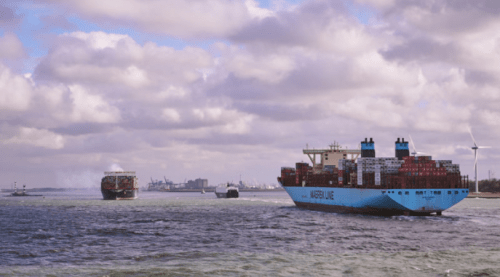A group of Denmark’s leading transport companies have joined forces on an ambitious project to develop an industrial-scale production facility for sustainable fuels for road, maritime and air transport in the Copenhagen area.
The companies – Copenhagen Airports, A.P. Moller – Maersk, DSV Panalpina, DFDS, SAS and Ørsted – envision a first-of-its-kind hydrogen and e-fuel production facility as soon as 2023. Once fully scaled-up by 2030, the project could deliver more than 250,000 tonnes of sustainable fuel for busses, trucks, maritime vessels, and airplanes each year.
Production would potentially be based on a total capacity of 1.3 gigawatts, which would likely make it one of the world’s largest facilities of its kind and reduce annual carbon emissions by 850,000 tonnes
The first stage, which could be operational by 2023, comprises a 10MW electrolyzer which can produce renewable hydrogen used directly to fuel busses and trucks. Stage two comprises a 250MW electrolyzer facility which could be operational by 2027 when the first offshore wind power from Rønne Banke wind farm off the island of Bornholm. Stage three, which could be operational by 2030 when the offshore wind potential at Bornholm has been fully developed, would upgrade the project’s electrolyzer capacity to 1.3GW and capture more sustainable CO2. The project has the potential to displace 5% of fossil fuels at Copenhagen Airport by 2027 and 30% by 2030.
“If realised as envisaged, the project will be located in the Greater Copenhagen Area and could supply renewable hydrogen for zero-emission busses tendered by Movia and heavy-duty trucks managed by DSV Panalpina, renewable methanol for A.P. Moller – Maersk vessels and renewable jet fuel (e-kerosene) for SAS airplanes and air transport out of Copenhagen Airports,” the partners said in a joint statement.
The project will require a large-scale supply of renewable electricity, which could potentially come from offshore wind power produced at Rønne Banke.
“Decarbonising the transport sector is a significant and complex task that requires collaborative contributions from every company, organisation, and country,” commented Søren Skou, CEO, A.P. Moller – Maersk. “This project provides a first step in the massive transformation to produce and distribute sustainable energy. In Denmark, we have an opportunity now to accelerate the green transformation and take lead in powering the future with sustainable energy and I am pleased that we can contribute with concrete actions. We need many such projects both in Denmark and around the globe to achieve our ambition in Maersk of becoming carbon neutral by 2050.”
